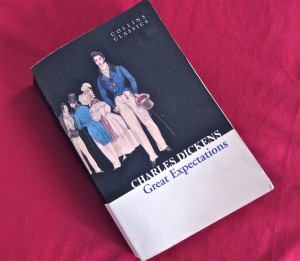CHARLES DICKENS
Great Expectations By Charles Dickens
Each time I read and reread Dickens I find his writing more interesting, more humorous, and revealing more layers.
In February on Charles Dickens’ 200th anniversary Don and I read ‘Great Expectations’ at the same time on our kindles. It is the second reading for me having read it the first time many years ago. Our reading took us a little longer than most modern books do, but it was much fun. Most nights we compared what we had read during the day and came up with humorous incidents that had us laughing again. We were filled too with much appreciation for this 200-year-old author.
Dickens is satirical of his times, looks deeply and critically into the foibles of his society but 200 years later we find the same foibles in our society. Great Expectations at first seems simple but it is a complex novel of love and cheer, loyalty and betrayal, guilt and innocence, and sympathy, sentimentality, and much wry wit.
The story is full of forebodings and dark too from time to time, but keeps the reader engaged throughout. We get great insight into the lives of the ordinary people and high society, into the lives of the poor and rich. The language is a little archaic but does not slow the reader. Much of the text is beautiful.
Expectations are several. We follow Pip’s character as he grows from a village boy to a young man lost to a man sensible and cultured and with good values.
A very strict and nasty older sister and her husband, Joe, bring up the orphan Pip. Joe, a kind mild mannered blacksmith, is a good influence in Pip’s life. His first expectation is to get a good education. But he is soon contracted by Miss Haversham to serve his apprenticeship with Joe with a view to becoming a blacksmith. Becoming a blacksmith is not part of the Pip’s ambition. His expectation is to be part of high society. The young boy wants to be well educated and move away from the village, move up to high society. Soon a mystery benefactor arranges through a prominent London lawyer to buy him out. Circumstances change immediately and Pip is sent to London on his way to becoming a gentleman. That comes at a cost. He is in Iove with a highly placed young lady in Miss Haversham’s care. And he knows nothing of money management and gets into debt squandering his quota of money from his benefactor in high living. Due to even more higher expectations he’s deeply disappointed when he finds out his benefactor is no nobleman. His fierce anger towards the man who is a criminal, whom he at first found not up to be to his expectations turns into kindness and love. This love for the stranger nearly costs his own life.
Towards the end he realizes that many of his expectations were merely superficial. He sheds his false values and looking for deeper meaning in life finds happiness and love.
Humour in the first chapter: Pip as a young boy is in the churchyard on a foggy evening and walks about looking at inscriptions on the tombstones, one of them is his parents’, both his father and mother buried in the same plot.
‘At the time I stood in the churchyard reading the family tombstones. I had just enough learning to be able to spell them out. My construction even of their simple meaning was not very correct for I read “Wife of the Above” was a complementary reference to my father’s exaltation to a better world.’
And Dickens has such witty and clever way of saying things. When Pip is a young man of means he says of his housekeeper and her niece:
‘They both had weak eyes, which I had long attributed to their chronically looking in at keyholes, and they were always at hand when not wanted, indeed that was their only reliable quality besides larceny.’
Love it.
My Collin’s Classics
Note: About Collins
In 1819, Millworker William Collins from Glasgow, Scotland, set p a company for printing and publishing pamphlets, sermons, hymnbooks and prayer book. That company was Collins and was to mark the birth of HarperColins Publishers as we know it today.






